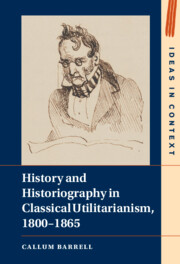Book contents
- History and Historiography in Classical Utilitarianism, 1800–1865
- Ideas in Context
- History and Historiography in Classical Utilitarianism, 1800–1865
- Copyright page
- Dedication
- Epigraph
- Contents
- Acknowledgements
- Conventions
- Introduction
- Part I Enlightened Historicisms
- Chapter 1 Jeremy Bentham on Historical Authority
- Chapter 2 James Mill and the Real Business of Philosophy
- Part II Historicism and Historiography
- Part III Sciences of History
- Conclusion
- Bibliography
- Index
Chapter 2 - James Mill and the Real Business of Philosophy
from Part I - Enlightened Historicisms
Published online by Cambridge University Press: 24 September 2021
- History and Historiography in Classical Utilitarianism, 1800–1865
- Ideas in Context
- History and Historiography in Classical Utilitarianism, 1800–1865
- Copyright page
- Dedication
- Epigraph
- Contents
- Acknowledgements
- Conventions
- Introduction
- Part I Enlightened Historicisms
- Chapter 1 Jeremy Bentham on Historical Authority
- Chapter 2 James Mill and the Real Business of Philosophy
- Part II Historicism and Historiography
- Part III Sciences of History
- Conclusion
- Bibliography
- Index
Summary
James Mill’s dogmatic rhetoric in his essay ‘On Government’ (1820) and his rejection in the History of British India (1817) of ocular and narrowly empirical methods, when seen against the febrile political backdrop of the early 1830s, was a gift to utilitarianism’s Whig, Tory, and Romantic opponents. However, his defence in A Fragment on Mackintosh (1835) of Bentham’s jurisprudence and moral philosophy, when placed in the context of his other late writings, suggests a different intention. In both his historical and political writings, James Mill pursued the ‘real business of philosophy’ in which general principles illuminated social phenomena and laid bare the emptiness of Whig empiricism. Only the ‘speculative man’ could appreciate the past’s distinctness by separating general from special causes, and Mill’s indebtedness to Francis Bacon and David Hume is evident in this respect. His attractions to Benthamite utilitarianism and Scottish philosophical history were variously deepened and underpinned by his readings of Bacon and Hume, and those readings, Barrell suggests, may have been encouraged by Dugald Stewart at Edinburgh.
Keywords
- Type
- Chapter
- Information
- Publisher: Cambridge University PressPrint publication year: 2021

